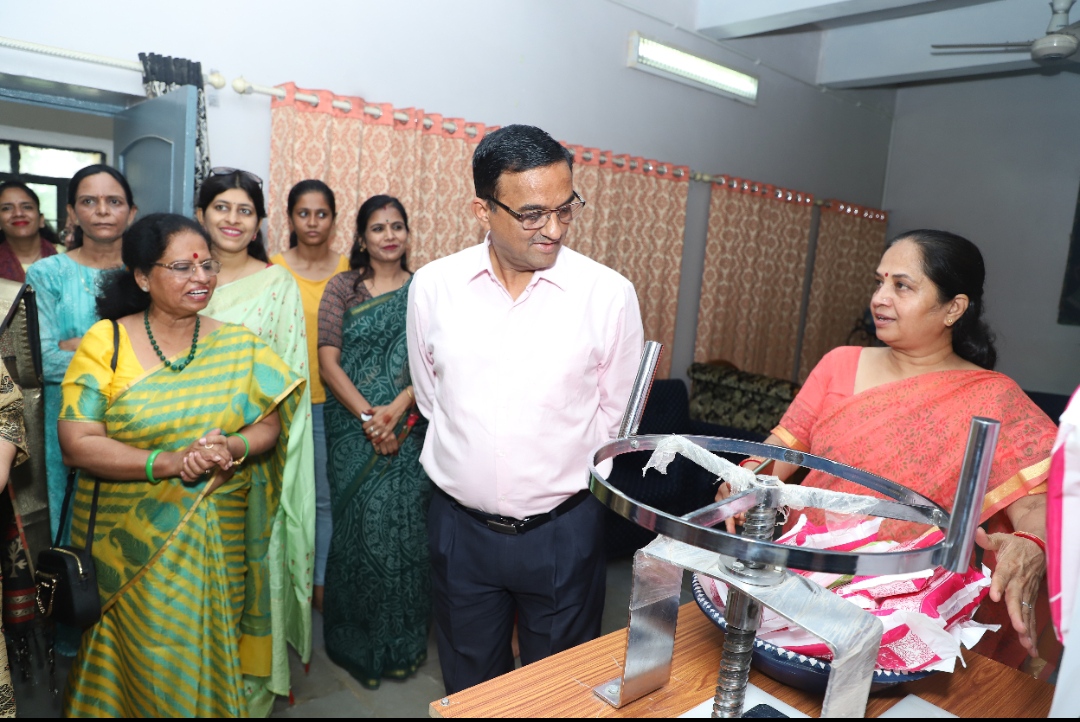Biodegradable Sanitary Pads Training: Entrepreneurship Focused and Environment Friendly Initiative by Sakhi- Dr. Narendra Singh Rathore

Resource Management and Consumer Sciences Department, CCAS, MPUAT organized a five day training program from 25-29 June 2022 for Hands On Training Programme On Manufacturing Of Biodegradable Sanitary Pads, where Mrs. Swati Bedekar and team taught college students to make biodegradable sanitary napkins.
On Thursday, Hon'ble Vice Chancellor Dr Narendra Singh Rathore while inspecting the program said that most of the women are familiar with regular sanitary napkins which are often available in drug stores, supermarkets etc. However, biodegradable sanitary napkins generate less waste than regular sanitary napkins and are therefore an eco-friendly alternative. When girls and women do not have safe and affordable sanitary napkins to manage menstruation, it can lead to various infections. Dr Rathore emphasized that since the Biodegradable Sanitary Napkin Manufacturing unit generate more output with the help of eco-friendly material available at relatively low cost, it can be an innovative and profitable business idea for the students.
Hon’ble vice chancellor Dr. Narendra Singh Rathore also inaugurated the housekeeping lab and visited the rooftop gardening unit developed under nutritional gardening sponsored by IDP/NAHEP.
Mrs. Swati Bedekar informed the girl students about the importance of a hygienic eco-system to raise awareness about menstrual hygiene and also ensured that girl students and rural women are encouraged to start the business of biodegradable sanitary napkins . Mrs Bedekar said that earlier Indian women used homemade or cloth pads during menstruation. With a few innovations, biodegradable sanitary napkins can be made with less cost and effort.
The process of making Biodegradable Sanitary Napkin is very simple, in which firstly the Banana fabric, absorption sheet and non-woven fabric are cut and folded according to the required size of the napkin and then it is pressed in the pressing machine. After coming out of the pressing machine, it is pasted on a pink covering sheet. Then the upper surface of the napkin is covered with a non-woven fabric sheet. The napkin is then cut and sealed into the shape of wings with a sealing machine. Then tape is applied on the bottom surface of the napkin and in the wings so that the napkin can be easily affixed to the cloth. The napkin is sterilized by putting it in an ultraviolet machine and packed afterwards. Mrs. Swati Bedekar said that today the Indian sanitary napkin market is growing at a rate of over 6% which is expected to cross USD 600 million by the year 2023.
This successful organization was a total team work of Dr. Suman Singh and Dr. Hemu Rathod - Organizing Secretary; Dr. Gayatri Tiwari- Co-Organization Secretary; Dr. Jaymala Dave, Dr. Arpita Jain, Mrs. Yashwant Menaria, Ms. Anjali Juyal- Coordinators. Ms. Anushka Tiwari, Mrs. Deepti, Ms. Manasa Thodeti and Ms. Bipasha Bhowmick co-coordinators provided technical assistance.
साभार :
© CopyRight Pressnote.in | A Avid Web Solutions Venture.






